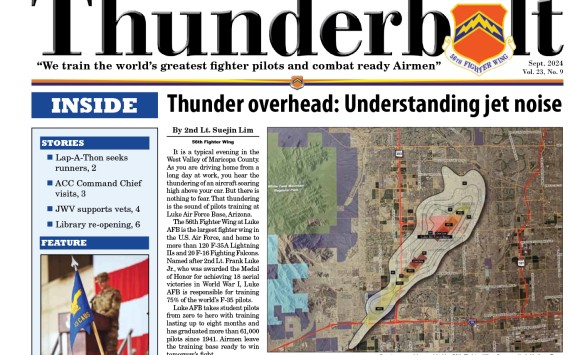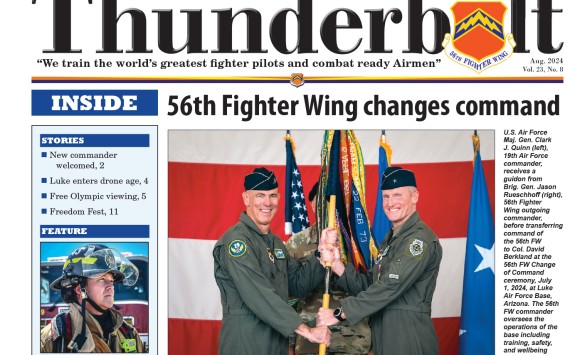RAMSTEIN AIR BASE, Germany — I used to wonder if people would look at me differently if they knew. Would they whisper about me? Would they tell others what happened? Does anyone actually have the guts to ask me what happened? Are they looking at me as the girl who’s related to a child killer?
I’m sure they were. I’m sure they wanted to ask the questions; wanted to know the true story and all the juicy details. But the truth is I didn’t know all the details. I only knew my brother killed a 7-year-old child.
It was May 18, 2001, when my first sergeant called me to his office and instructed me to bring my supervisor and flight chief. I had never even been in trouble before. Actually, I didn’t even know who my shirt was, or what he did. I just knew he wanted to see me and my leadership immediately. He was waiting outside his office when I walked down the hall and had a look of concern on his face. Was this because I was in real trouble, or because he had bad news? I didn’t know; I only knew my heart was racing, my hands were sweaty and the tears were coming.
After we entered his office, he instructed me to sit. He asked me if I had heard from any of my family members that day and when the last time was I spoke to my brother. I stated no to the family question and informed him that I had spoken to my brother the night before. He then handed me the telephone and instructed me to call my mother. I asked him what was going on and he said it would be best if I heard it from my mother. So I dialed … but no answer. I called my brother … but no answer. After three or four attempts, he told me to stop dialing. He told me that news cameras were at the main gate of the base asking about me.
At the time, I was stationed at Scott Air Force Base, Illinois. It wasn’t a high-visibility base, I wasn’t popular and I didn’t have ties to the community, so I had no idea what he was talking about.
He then took me in to the orderly room and turned on the television. There was a breaking news story being broadcasted about a drunken driver killing a child at the St. Louis Zoo. My heart was still racing until I heard the reporter say my brother’s name. My heart stopped. I felt all the blood in my face rush to my chest. I couldn’t hear the television anymore. I couldn’t hear my heart beating anymore. I only saw people staring at me. What were they saying? What were they thinking?
Then I felt someone squeezing my arm.
It was my shirt. He was asking me to come back into his office. I sat in his office for about 15 minutes with everyone staring at me. No one spoke, they just stared. Finally I asked if I could go home. He said yes, but I had to talk to public affairs first before I could leave the base.
After signing several documents agreeing not to make any statements to reporters and not be seen on camera in my uniform, I was allowed to leave the base. But I still had to go to my duty section to get my things. More stares. More looks. No speaking. Just staring.
Eventually I made contact with my mother and was instructed to go to a nearby hospital. Once I arrived, police took my necessary information and informed me that my brother was speeding through the St. Louis Zoo and ran into a crowd of children on a school field trip, killing one child on impact. His blood alcohol level was 0.26. I asked if I could see my brother and the cop said, “Ma’am, I’ll be honest with you, we aren’t supposed to let anyone see him, but I will give you five minutes because this is the last time you are going to see him for a while.” He was correct. It would be seven months before I would lay eyes on my brother again. His trial started Nov. 27, 2001, and on Jan., 31, 2002, one month after his 20th birthday, he was sentenced to 20 years in prison for involuntary manslaughter.
The child was 7 years old. It was his first field trip to the St. Louis Zoo. His mother bought him new shoes the night before to wear for his special trip and he spent the entire night breaking them in for his big day. Neither he nor his mother knew that this field trip, his first one to the zoo, would also be his last. My brother was going 64 mph in a 20-mph zone. He swerved too far to the right and ran into the crowd of children heading back to their bus after their exciting trip. The child was killed instantly. Another child suffered a crush injury to the foot and a teacher suffered from a broken pelvis.
My brother ended up with a broken femur and other minor injuries. Was that enough? Did he deserve more? I can’t answer that; never have and never will I try to answer that question. I’ve had several people tell me that my brother should have died during the accident. I had a woman tell me he should receive the death penalty for taking the life of a child. Do I share her same sentiment? No, but that’s from the love of a sister. If I was that child’s mother, would my answer be different? Maybe. I can’t say for sure. What I do know is that my brother’s accident has followed me, haunted me and affected me since May 18, 2001.
Part of my brother’s sentence/plea deal was to pay restitution to the family. That responsibility falls on me. I pay $500 a month to the family and $3,000 every time my brother meets the parole board, which is every four years.
• $500 per month x 20 years
+ interest = more than $184,000
• Parole at $3,000 x every four years
+ interest = more than $10,000
• Total payment over 20-year
sentence = more than $200,000
Is anyone’s child, wife, husband, mother or father worth this amount of money? We all know the answer. Drunken drivers know the answer. They know the answer before the first drink. But the answer becomes irrelevant once the keys are in the ignition.
I have volunteered for Airmen Against Drunk Driving several times throughout my career. Every time I do it, I wonder how AADD would have affected my brother that day in 2001. If he was military, would he have called AADD? Would he use this free resource that would have saved the life of that little boy? Probably not. Some Airmen, like my brother, are no stranger to drinking and driving; the fact is they haven’t gotten caught.
The harsh reality of a DUI is clear; you, the drunken driver, aren’t the only one affected. I don’t know if Airmen understand that. I wonder if they know that getting a DUI is more than losing a stripe, performing extra duty and forfeiture of pay. I wonder if Airmen know they can and will kill someone if they drink and drive. I wonder if their families have the means to pay their restitution. Will their families see their story on the news and get stared at by total strangers? Is their family ready for the hateful comments that will be spewed at them? Are their families ready to see them in prison on Saturdays from 9 a.m. to 2 p.m. for the next 20 years? No. From personal experience, one is never ready for that.
Like most Airmen, I look forward to the weekend, however, my excitement is for different reasons. I’m excited to see how many Airmen call AADD for assistance. I get excited to see how many cars are heading out the gate to pick up Airmen in need. I’m happy to see all the volunteer vehicles out of their spaces, because that lets me know that Airmen are making smart decisions. However, as a first sergeant, it saddens me when I have to pick someone up for a DUI and tell them my story. It makes me angry to know that they have the resources to prevent it at their fingertips, but choose not to use them. Let’s face it, drinking and driving is a choice; a choice that affects everyone in your path.











